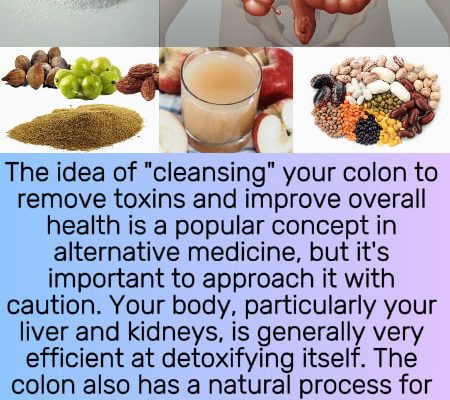The idea of “cleansing” your colon to remove toxins and improve overall health is a popular concept in alternative medicine, but it’s important to approach it with caution. Your body, particularly your liver and kidneys, is generally very efficient at detoxifying itself. The colon also has a natural process for eliminating waste through regular bowel movements.

While there’s limited scientific evidence to support many of the grand claims about “colon cleanses” for general health or detoxification, certain natural practices can support healthy bowel function and overall digestive health. These methods focus on promoting regular and healthy bowel movements rather than aggressive “flushing.”
Here are some natural approaches that contribute to a healthy colon:
1. Hydration is Key:
The simplest and most fundamental way to support your colon is to drink plenty of water. Water helps to soften stool, making it easier to pass and preventing constipation. Aim for 6-8 glasses of lukewarm water per day, and incorporate water-rich fruits and vegetables into your diet.
2. Embrace a High-Fiber Diet:
Fiber is crucial for colon health. It adds bulk to stool, which helps it move through your digestive system more efficiently.
- Sources: Fruits, vegetables, whole grains, nuts, seeds, and legumes (beans, lentils, peas, chickpeas) are excellent sources of fiber.
- Benefits: A high-fiber diet can help regulate bowel movements, prevent constipation, and support the growth of beneficial gut bacteria.
3. Incorporate Probiotics:
Probiotics are beneficial bacteria that contribute to a healthy gut microbiome. A balanced gut can aid digestion and promote regular bowel movements.
- Sources: Fermented foods like yogurt, kefir, kimchi, sauerkraut, and pickles are good sources of probiotics. You can also consider probiotic supplements after consulting with a healthcare professional.
4. Consider Resistant Starches:
Resistant starches are carbohydrates that resist digestion in the small intestine and ferment in the large intestine, feeding beneficial gut bacteria.
- Sources: Foods like potatoes (especially cooled after cooking), rice, legumes, green bananas, and some grains.
5. Herbal Teas (with caution):
Some herbal teas may offer mild laxative effects or support digestive health.
- Examples: Teas with ginger can stimulate digestion. Psyllium, aloe vera, and marshmallow root may help with constipation, but these should be used sparingly and under guidance, as excessive use of stimulant laxatives can be detrimental.
6. Gentle Home Remedies for Constipation Relief:
If you’re experiencing occasional constipation, some gentle remedies can help:
- Saltwater Flush (use with extreme caution): Some sources suggest mixing 2 teaspoons of sea salt or pink salt with lukewarm water and drinking it on an empty stomach. This can stimulate bowel movements. However, this method can cause significant dehydration and electrolyte imbalances, especially for individuals with high blood pressure, kidney disease, or heart conditions. It’s generally NOT recommended without medical supervision.
- Lemon Water and Honey: A mixture of fresh lemon juice, honey, and a pinch of salt in warm water, consumed on an empty stomach, is a traditional remedy some find helpful.
- Olive Oil: A teaspoon of olive oil on an empty stomach may act as a lubricant and soften stool.
- Prune Juice/Dried Prunes: Prunes are known for their natural laxative effect due to their high sorbitol content.
7. Regular Exercise:
Physical activity can stimulate bowel movements and contribute to overall digestive health. Aim for regular walks, aerobic exercise, or yoga.
Important Considerations and Warnings:
- Your Body’s Natural Processes: Your colon is a remarkable, self-cleaning organ. It naturally eliminates waste and maintains a healthy bacterial balance. Aggressive “cleanses” can disrupt this natural balance.
- Lack of Scientific Evidence: Most claims about “detoxifying” the body or preventing disease through colon cleanses are not supported by scientific research.
- Potential Risks: Some colon cleansing methods, especially those involving strong laxatives, enemas, or colon hydrotherapy (colonics), can carry significant risks, including:
- Dehydration and electrolyte imbalances (which can be dangerous, especially for those with heart or kidney conditions).
- Disruption of beneficial gut bacteria.
- Nausea, vomiting, cramping, and diarrhea.
- Infection from contaminated equipment (in the case of colonics).
- Bowel perforation (a tear in the colon), though rare, can be life-threatening.
- Interference with medication absorption.
- Consult a Doctor: If you have concerns about your bowel habits, chronic constipation, bloating, or any other digestive issues, it’s always best to consult a healthcare professional. They can properly diagnose the cause of your symptoms and recommend safe and effective treatments.
- Medical Colon Cleanses: The only time a colon cleanse is medically necessary and safe is for preparing for procedures like a colonoscopy, which is done under a doctor’s supervision.
Instead of focusing on harsh “cleanses,” prioritize a lifestyle that promotes long-term colon health: a diet rich in fiber, adequate hydration, regular exercise, and a balanced gut microbiome.


